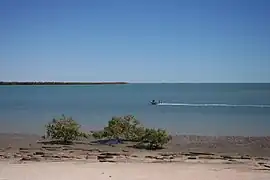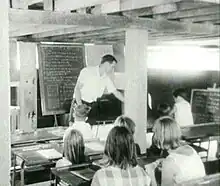Karumba, Queensland
Karumba is a town and a coastal locality in the Shire of Carpentaria, Queensland, Australia.[3][4] In the 2016 census, the locality of Karumba had a population of 531 people.[1]
| Karumba Queensland | |||||||||||||||
|---|---|---|---|---|---|---|---|---|---|---|---|---|---|---|---|
 Karumba Beach Gulf Savannah | |||||||||||||||
 Karumba | |||||||||||||||
| Coordinates | 17.4838°S 140.8397°E | ||||||||||||||
| Population | 531 (2016 census)[1] | ||||||||||||||
| • Density | 3.882/km2 (10.053/sq mi) | ||||||||||||||
| Postcode(s) | 4891 | ||||||||||||||
| Elevation | 2 m (7 ft)[2] | ||||||||||||||
| Area | 136.8 km2 (52.8 sq mi) | ||||||||||||||
| Time zone | AEST (UTC+10:00) | ||||||||||||||
| Location |
| ||||||||||||||
| LGA(s) | Shire of Carpentaria | ||||||||||||||
| State electorate(s) | Traeger | ||||||||||||||
| Federal division(s) | Kennedy | ||||||||||||||
| |||||||||||||||
| |||||||||||||||
Geography
Karumba is in the Gulf Country region of Queensland, 71 kilometres (44 mi) by road from Normanton and 2,159 kilometres (1,342 mi) from the state capital, Brisbane. Karumba is within the Shire of Carpentaria, the administrative headquarters of which is in Normanton. The town is sited at the mouth of the Norman River, and enjoys the distinction of being the only town along the southern Gulf of Carpentaria that is within sight of the Gulf itself (the Gulf's extensive tidal flats prohibits settlement elsewhere along its shore).
The rare Morning Glory cloud rolls through Karumba in the early hours of some mornings in September and October.
Karumba Airport is on Fielding Street. There are no regular commercial services from this airport; the nearest regular services are available at Normanton Airport.[5]
History
The settlement was previously known as Norman Mouth and Kimberley.[6] The toponym derives from the Kareldi native name, Kurumba, who were the indigenous landholders of this area before the onset of white colonization and expropriation.[7] This name was officially used for the township by the 1880s.[6]
Karumba Post Office opened on 22 August 1889 and closed in 1919.[8]
Given its access to the Gulf of Carpentaria, the town's economy has revolved largely around fishing. The prawn industry expanded in the 1960s.[6]
In the late 1930s, the town was a refueling and maintenance stop for the flying boats of the Qantas Empire Airways.[6] No. 43 Squadron of the RAAF also operated Consolidated PBY Catalina flying boats from the town between June 1943 and April 1944.[9]

Karumba State School opened in September 1968.[10][11]
Regular services by the Uniting Church in Australia are held in the Community Church. These are provided by the McKay Patrol, an aerial service of the Uniting Church in Australia that operates out of Cloncurry. Supported by other denominations, the McKay Patrol operates a Cessna 182Q aeroplane to provide spiritual and practical help to people living in remote areas in the north-west of Queensland and the eastern Tablelands of the Northern Territory, an area of approximately 625,000 square kilometres (241,000 sq mi) with a population of less than 10,000 people.[12][13][14]
Karumba Public Library was opened in 1979.[15]
The region is repeatedly mentioned in the song "Every Passing Day" by Australian band Goanna on their album Oceania.[16]
In the 2006 census, Karumba had a population of 518.[17]
The Red Hot Chili Peppers' song "Animal Bar" from their 2006 album Stadium Arcadium is about Karumba. It is named after a bar called the Animal Bar.[18]
In the 2016 census, the locality of Karumba had a population of 531 people.[1]
Economy
The Karumba port services the Century Zinc Mine as well as fishing industry.
The prawning industry makes an important economic contribution to the town.[19]
Education
Karumba State School is a government primary (Prep-6) school for boys and girls at 5 Yappar Street (17.4829°S 140.8403°E).[20][21] In 2018, the school had an enrolment of 28 students with 3 teachers and 7 non-teaching staff (4 full-time equivalent).[22]
There are no secondary schools in Karumba. The nearest government secondary school is Normanton State School (to Year 10) in neighbouring Normanton to the south. There are no schools offering secondary education to Year 12 in Karumba or nearby; the options are distance education or boarding school.[23]
Amenities
Karumba has a public library in Walker Street, visitor information centre, parks, bowls club, golf course, swimming pool, and a sports centre.[24][25]
The Carpentaria Shire Council operates a public library at Walker Street.[26]
St James' and St John's Community Church at 59 Yappar Street is shared by the Anglican, Catholic and Uniting congregations. It is within the Gulf Savannah Parish of the Roman Catholic Diocese of Cairns.[27]
Regular services by the Uniting Church in Australia are held in the Community Church. These are provided by the McKay Patrol, an aerial service of the Uniting Church in Australia that operates out of Cloncurry. Supported by other denominations, the McKay Patrol operates a Cessna 182Q aeroplane to provide spiritual and practical help to people living in remote areas in the north-west of Queensland and the eastern Tablelands of the Northern Territory, an area of approximately 625,000 square kilometres (241,000 sq mi) with a population of less than 10,000 people.[12][13][14]
Climate
Karumba has a tropical savanna climate (Köppen Aw) with two distinct seasons. The “Wet” usually lasts from December to March and is extremely hot and humid, with wet bulb temperatures typically above 27 °C or 80.6 °F during the afternoons. Most roads during the “Wet” are usually closed by heavy rain, which can exceed 250 millimetres or 9.84 inches in a day due to the passage of tropical cyclones or monsoonal depressions which provide most of the rain. On occasions, however, as with all of Queensland the wet season may fail almost completely and produce less than 350 millimetres (13.78 in) in a full season.
The “Dry” usually lasts from April to the middle of November and is much more comfortable due to lower humidity and milder morning temperatures. This period of the year is essentially bone dry and almost completely cloudless: median rainfall is nil between May and September and over twenty days each month are completely clear.
| Climate data for Karumba, Queensland (1938-2012) | |||||||||||||
|---|---|---|---|---|---|---|---|---|---|---|---|---|---|
| Month | Jan | Feb | Mar | Apr | May | Jun | Jul | Aug | Sep | Oct | Nov | Dec | Year |
| Record high °C (°F) | 39.8 (103.6) |
37.6 (99.7) |
38.4 (101.1) |
38.9 (102.0) |
34.5 (94.1) |
32.8 (91.0) |
32.4 (90.3) |
35.4 (95.7) |
36.9 (98.4) |
40.4 (104.7) |
40.7 (105.3) |
41.3 (106.3) |
41.3 (106.3) |
| Average high °C (°F) | 32.1 (89.8) |
31.7 (89.1) |
32.5 (90.5) |
32.6 (90.7) |
29.8 (85.6) |
27.9 (82.2) |
27.5 (81.5) |
28.6 (83.5) |
29.9 (85.8) |
31.3 (88.3) |
32.6 (90.7) |
32.4 (90.3) |
30.7 (87.3) |
| Average low °C (°F) | 24.4 (75.9) |
24.1 (75.4) |
23.2 (73.8) |
20.7 (69.3) |
17.2 (63.0) |
15.2 (59.4) |
14.0 (57.2) |
15.2 (59.4) |
18.2 (64.8) |
21.0 (69.8) |
23.3 (73.9) |
24.4 (75.9) |
20.1 (68.2) |
| Record low °C (°F) | 19.6 (67.3) |
18.3 (64.9) |
18.0 (64.4) |
13.6 (56.5) |
8.0 (46.4) |
6.9 (44.4) |
6.1 (43.0) |
5.3 (41.5) |
10.6 (51.1) |
12.2 (54.0) |
17.8 (64.0) |
17.9 (64.2) |
5.3 (41.5) |
| Average rainfall mm (inches) | 231.0 (9.09) |
260.3 (10.25) |
156.6 (6.17) |
30.3 (1.19) |
1.0 (0.04) |
8.5 (0.33) |
7.1 (0.28) |
2.0 (0.08) |
1.6 (0.06) |
7.3 (0.29) |
45.5 (1.79) |
142.1 (5.59) |
893.3 (35.16) |
| Average rainy days (≥ 0.2 mm) | 12.7 | 14.7 | 9.3 | 2.8 | 0.4 | 1.0 | 0.6 | 0.4 | 0.4 | 0.9 | 4.2 | 8.9 | 56.3 |
| Source: Australian Bureau of Meteorology [28] | |||||||||||||
See also
References
- Australian Bureau of Statistics (27 June 2017). "Karumba (SSC)". 2016 Census QuickStats. Retrieved 20 October 2018.
- Bureau of Meteorology Archived 26 July 2008 at the Wayback Machine. Retrieved on 5 July 2008
- "Karumba – town in Shire of Carpentaria (entry 17782)". Queensland Place Names. Queensland Government. Retrieved 27 November 2018.
- "Karumba – locality in Shire of Carpentaria (entry 42910)". Queensland Place Names. Queensland Government. Retrieved 27 November 2018.
- "Airports". Carpentaria Shire Council. Archived from the original on 9 July 2021. Retrieved 5 July 2021.
- Environmental Protection Agency (Queensland) (2002). Heritage Trails of the Queensland Outback. State of Queensland. p. 97. ISBN 0-7345-1040-3.
- Norman Tindale,Aboriginal Tribes of Australia: Their Terrain, Environmental Controls, Distribution, Limits, and Proper Names, Australian National University 1974 p.174.
- Premier Postal History. "Post Office List". Premier Postal Auctions. Archived from the original on 15 May 2014. Retrieved 10 May 2014.
- "No. 43 Squadron". RAAF Museum Point Cook. Royal Australian Air Force. Archived from the original on 26 March 2018. Retrieved 1 April 2018.
- "Opening and closing dates of Queensland Schools". Queensland Government. Retrieved 18 April 2019.
- "History". Karumba State School. 3 February 2020. Retrieved 25 September 2023.
- "Find a Church". Uniting Church in Australia, Queensland Synod. Archived from the original on 24 October 2020. Retrieved 22 November 2020.
- "About the McKay Patrol". McKay Patrol. Archived from the original on 11 March 2020. Retrieved 12 September 2021.
- "About MJZ". McKay Patrol. Archived from the original on 11 March 2020. Retrieved 12 September 2021.
- "Queensland Public Libraries Statistical Bulletin 2016-2017" (PDF). Public Libraries Connect. November 2017. Archived (PDF) from the original on 30 January 2018. Retrieved 30 January 2018.
- LampoCastor (19 July 2008). "Goanna - Every Passing Day". Archived from the original on 19 April 2018. Retrieved 19 April 2018 – via YouTube.
- Australian Bureau of Statistics (25 October 2007). "Karumba (Urban Centre/Locality)". 2006 Census QuickStats. Retrieved 5 July 2008.
- "Animal Bar, Karumba Lodge". Archived from the original on 2 February 2017. Retrieved 30 January 2017.
- "Travel: Normanton". The Sydney Morning Herald. Fairfax Media. 8 February 2004. Archived from the original on 31 May 2014. Retrieved 11 December 2012.
- "State and non-state school details". Queensland Government. 9 July 2018. Archived from the original on 21 November 2018. Retrieved 21 November 2018.
- "Karumba State School". Karumba State School. 3 February 2020. Archived from the original on 1 April 2020. Retrieved 29 August 2022.
- "ACARA School Profile 2018". Australian Curriculum, Assessment and Reporting Authority. Archived from the original on 27 August 2020. Retrieved 28 January 2020.
- "Queensland Globe". State of Queensland. Retrieved 29 August 2022.
- "Karumba Library". Archived from the original on 2 February 2017. Retrieved 30 January 2017.
- "Karumba". Karumba Progress Association. Archived from the original on 14 January 2014. Retrieved 13 November 2013.
- "Karumba Library". Public Libraries Connect. State Library of Queensland. 9 February 2017. Archived from the original on 30 January 2018. Retrieved 30 January 2018.
- "Gulf Savannah Parish". Roman Catholic Diocese of Cairns. Archived from the original on 18 November 2020. Retrieved 18 November 2020.
- "Climate Statistics for Karumba, Queensland". Archived from the original on 24 February 2020. Retrieved 21 March 2012.
External links
- University of Queensland: Queensland Places: Karumba
- morningglorycloud.com has video of the Gulf of Carpentaria region and the Morning Glory Cloud
- Carpentaria Shire Council homepage
- General information from the Sydney Morning Herald
- Town map of Karumba, 1979